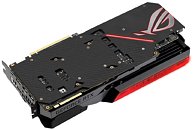Monday, January 7th 2019

ASUS to Introduce the ROG MATRIX GeForce RTX 2080 Ti Graphics Card With Integrated AIO "Infinity Loop"
ASUS is looking to one-up the competition in the flagship graphics card market with its ROG MATRIX rendition of the RTX 2080 Ti interpretatioin of NVIDIA's silicon. The ROG MATRIX GeForce RTX 2080 Ti will incorporate an AIO watercooling solution complete with waterblock, pump, radiator and fans in a triple-slot design. ASUS claims the Infinity Loop cooler will bring about performance equivalent of that of an external 240mm AIO - a bold claim, since physics and proximity of the radiator and fans themselves to the PCB and die should dictate a higher temperature than an otherwise completely external solution.
That said, the design of the Infinity Loop is likely one of the most interesting graphics card cooling designs in some time, with a completely self-contained solution. The shroud and side of the graphics card feature laser cutouts and LED-illuminated elements (because 2019 wouldn't be much different from 2018 in that regard). Out-of-the-box clocks are set at 1815 MHz before any additional overclocking, and the card takes power from 2x 8-pin power connectors. The cost? North of $1600. Now that's design, even in the price-tag.
Source:
ASUS
That said, the design of the Infinity Loop is likely one of the most interesting graphics card cooling designs in some time, with a completely self-contained solution. The shroud and side of the graphics card feature laser cutouts and LED-illuminated elements (because 2019 wouldn't be much different from 2018 in that regard). Out-of-the-box clocks are set at 1815 MHz before any additional overclocking, and the card takes power from 2x 8-pin power connectors. The cost? North of $1600. Now that's design, even in the price-tag.



28 Comments on ASUS to Introduce the ROG MATRIX GeForce RTX 2080 Ti Graphics Card With Integrated AIO "Infinity Loop"
Seems a bit daft to me but what do I know...
Not all do not get me wrong, but definitely a part.
But since we change graphics cards every two years, almost every year ... Asus expects you to sell them as soon as they present the new line.